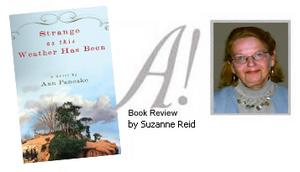

Ann Pancake's debut novel, Strange as This Weather Has Been, is a stunning experience, especially for readers in this region so close to the travesties of "mountaintop removal" caused by strip mining.
The first half of the novel introduces the six main characters, each chapter alternating with a different voice, and sets up an interesting web of inter-relationships within a West Virginia mountain family -- the oldest generations culling food, medicine, and spirit from the land, and the younger men working the underground mines.
The second half of the novel gallops through layers of fact and story, waves of revelation, in one convulsive gulp. The last half is addictively horrifying, strong violent writing that will propel you not only through the terrors of the Buffalo Creek flood of 1972 that killed 124 people, but also into the hearts of a family disintegrating from fear, poverty, grief, and anger. But none of this sadness would grab your heart so deeply if you hadn't been made to care about each individual character.
Lace, back from West Virginia University after three lonely months, enmeshes herself with Jimmy Make, still in high school, because she can feel the heat of his wanting her. She names their first child Bantella, a "solemn, watchful child, even as a little baby you could see all that in her....she was born with the age in her." Bant (for short) feels deeply for the hills, "how they hold you . . . giving you always, for good or for bad, the sense of being held."
Lace, her mother, and daughter Bant have learned to live from the land, reveling in the seasons. After the stark gray winter, spring begins in the woods with "nubbly little coltsfoot nudging up out of the ditches" and the "sarvis" trees (service tree, so named because it signaled the earliest time after winter when church services could be held), their white spare blossoms like "fairy's breath."
With the birth of their second child, Lace marries Jimmy, though she has already begun to realize that he, like so many other boy-men, is simple -- with "no distance or depth in how he could see." Their children soon include Corey, a miniature Jimmy, in love with the power and noise of speed and engines; Dane, silent and timid, ground up by internal fears and horrified by the unseemly womanish curves of his developing body; and Tommy, the tag-along baby who brings out the tenderness in Lace and the careless laziness of Jimmy.
The threat that (literally) hangs over this family and the community is the encroachment of coal companies on their land. First are the algae-greasy pools, the dead fish and lizards, and then roads barred with gates, guards, and deep gullies of mud. The mountains are stripped of trees: "To the coal company, trees were nothing but in the way, they just bulldozed them over the side, and there they dangled, their roots spooky, hairy and dirt-clotted." Then the mountaintops are scraped off and filled with rock rubble, unstable to walk on, a bare sterile surface that collects water that rises, breaks through, and crashes down into the valley below, slamming logs, trash, poisons, machine parts and anything else in its path into the homes below.
This sounds bleaker than it is, although Pancake's portrayal of the looming dangers is threateningly real. The book is reamed with interesting facts, stories, and thought-provoking riffs on subjects like school and leaving home. However, it is her vivid language that leaves the strongest impression. Pancake invents words and phrases more apt than the originals -- Bant "scrawls" up a cliff on her hands and feet, the severed mountaintop is a moonscape turned upside down. Lace's grandfather Mogey describes how Appalachians have a "love for land not spectacular....In the west, the mountains are mostly horizon....[Here] it's not just the tops, but the sides that hold us."
This book will hold you, too. It should be required reading for all concerned citizens but, unlike most diatribes, this novel will please your senses and your heart as well as fill your mind.
About Suzanne Reid: After a rural Yankee childhood, she moved south to earn an M.A. in English at the University of Virginia in Charlottesville and a Ph.D. in Education from Virginia Tech. She is an assistant professor at Emory & Henry College. She has published numerous articles and five books about Young Adult Literature and is currently researching the role of children in Shakespeare's plays. Currently serving on The Arts Depot board of directors, she also gardens, kayaks, reads, and talks a lot.